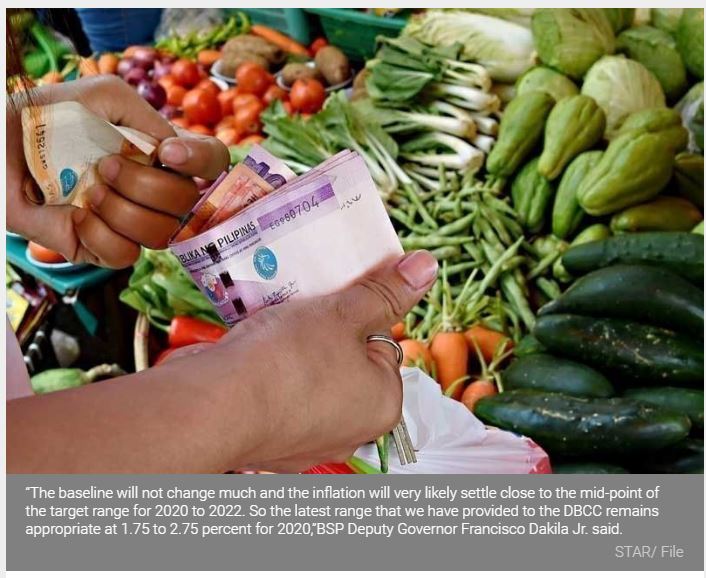Philippines: BSP tightens inflation target to 1.75%-2.75%
MANILA, Philippines — The Bangko Sentral ng Pilipinas (BSP) has revised the inflation assumption for this year amid the uptick in July and rising global oil prices.
In a virtual press briefing, BSP Deputy Governor Francisco Dakila Jr. said the Cabinet-level Development Budget Coordination Committee (DBCC) has revised the inflation target to a range of 1.75 percent to 2.75 percent for 2020 from the original assumption of 1.75 percent to 3.75 percent, due to subdued demand amid the COVID-19 pandemic.
“The baseline will not change much and the inflation will very likely settle close to the mid-point of the target range for 2020 to 2022. So the latest range that we have provided to the DBCC remains appropriate at 1.75 to 2.75 percent for 2020,” Dakila said.
Dakila told reporters the assumption for 2021 and 2022 was retained at two to four percent, the same as the target set by the BSP.
“This means that prices in the typical consumption basket of Filipino families will remain stable and predictable,” DBCC said.
The DBCC has raised the assumption for the price of Dubai crude oil per barrel based on the futures market to a range of $35 to $45 per barrel instead of $23 to $38 per barrel for this year.
The oil price assumption for 2021 and 2022, DBCC said, was maintained at a range of $35 to $50 per barrel.
Inflation averaged 2.5 percent from January to July despite picking up to a six-month high of 2.7 percent in July due to higher transportation cost amid the mobility restrictions to slow the spread of the virus.
Jun Neri, lead economist at Ayala-led Bank of the Philippine Islands (BPI), said stable oil prices and weak consumer demand would likely keep inflation within the two to four percent target of the BSP this year.
The bank expects this year’s inflation to average at 2.6 percent.
Neri said demand would likely deteriorate again as NCR and nearby provinces shifted back to modified enhanced community quarantine.
“Consumer demand has improved compared to its level in April and May given the reopening of the economy, but it is still below the level seen in previous years. With the reclassification of NCR and nearby provinces to modified enhanced community quarantine, demand will likely deteriorate gain,” Neri said.
Neri pointed out the gap between inflation and the policy rate has expanded further given the recent uptick in consumer prices.
“With real interest rates now at negative, we reiterate our view that it might be more difficult to bring down the policy rates further in the coming months. Moreover, there is reason to believe that additional rate cuts will only bring marginal benefits for the economy,” Neri said.
The Monetary Board has so far slashed interest rates by 175 basis points to an all-time low of 2.25 percent as part of COVID-19 measures that unleashed P1.3 trillion in the financial system.
“Risk aversion both on the part of the banks and the private sector will most likely limit the expansion of lending. We reiterate that the recovery of the economy will depend on fiscal spending and the improvement in the country’s health situation. Monetary policy has its limits,” Neri said.
Economic managers are now looking at a deeper contraction of 5.5 percent instead of two to 3.4 percent this year as gross domestic product suffered a record 16.5 percent contraction in the second quarter and nine percent for the first half.
Source: https://www.philstar.com/business/2020/08/07/2033407/bsp-tightens-inflation-target-175-275


 English
English




